| Srl | Item |
| 1 |
ID:
147404
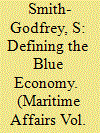

|
|
|
|
|
| Summary/Abstract |
Oceans are increasingly gaining in importance in terms of enabling international trade via linking sellers and buyers. The behaviour patterns of such linking enablers on the oceans are receiving more attention from a regulatory and economic perspective as the relationship between land and ocean evolves in its role and importance. The “Blue Economy” as a concept finds its origin against this background. A literature review is undertaken to analyse an appropriate definition for the Blue Economy. These definitions are analysed in terms of the minimum criteria which are necessary for a Blue Economy. The paper also attempts to structure various types of activities which are associated with ocean services. It is done with a view to identify what one may perceive as the focus areas for the growth of the Blue Economy.
|
|
|
|
|
|
|
|
|
|
|
|
|
|
|
|
| 2 |
ID:
185708
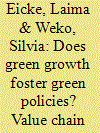

|
|
|
|
|
| Summary/Abstract |
The expansion of renewable energies not only lowers carbon emissions, it also redistributes resources among actors. This article argues that green industrialization – specifically, manufacturing and the development of renewable energy technologies — creates economic gains that impact political processes and increase renewable energy policy ambition. Building on a combined framework of policy feedback and global value chain literature, we see domestic value creation as a key determinant of coalition strength and learning effects for policymakers. We analyze the relationship of value chain involvement to policy ambition using panel data on countries’ manufacturing and innovation activities in the wind and solar industry from 2010 to 2018. The results show a positive technology policy feedback mechanism, implying that higher local value creation leads to more ambitious renewable energy policies. These first large-N findings support previous case studies on the importance of green growth for raising policy ambition; it implies that transformative policies fostering value creation could create a virtuous cycle for policy ambition. We further propose an interdisciplinary research agenda to shed light on the role of value chain dynamics for policy feedback mechanisms across different political economies.
|
|
|
|
|
|
|
|
|
|
|
|
|
|
|
|
| 3 |
ID:
176118
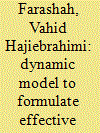

|
|
|
|
|
| Summary/Abstract |
The petrochemical industry plays a pivotal role in achieving high value-added products from oil and gas reserves. With attention to oil and gas reserves in Iran, it is clear that the petrochemical industry has not grown up adequately. This study aims to determine effective factors on petrochemical industry development and model the mechanism of capacity expansion budget creation using a system dynamics approach. A quantified system dynamics model has been built based on causal relationships and the mechanism of development budget allocation among categorized products. This structure is used to simulate the model and investigate essential variables related to each product, such as production capacity value, production rate, domestic sale revenue, and export. According to the results of a simulation, in 2025, Iran will have a capacity of approximately 104 million tons of petrochemical products that is not desirable. In this study, a policy of improving budget plan and allocation is introduced as the most effective solution to achieve the petrochemical industry development. By implementing this policy the production capacity and total revenue would respectively be improved by 4% and 13% in 2025 in comparison with the base run.
|
|
|
|
|
|
|
|
|
|
|
|
|
|
|
|
| 4 |
ID:
097427
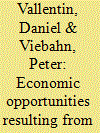

|
|
|
|
|
| Publication |
2010.
|
| Summary/Abstract |
Several energy scenario studies consider concentrated solar power (CSP) plants as an important technology option to reduce the world's CO2 emissions to a level required for not letting the global average temperature exceed a threshold of 2-2.4 °C. A global ramp up of CSP technologies offers great economic opportunities for technology providers as CSP technologies include highly specialised components. This paper analyses possible value creation effects resulting from a global deployment of CSP until 2050 as projected in scenarios of the International Energy Agency (IEA) and Greenpeace International. The analysis focuses on the economic opportunities of German technology providers since companies such as Schott Solar, Flabeg or Solar Millennium are among the leading suppliers of CSP technologies on the global market.
|
|
|
|
|
|
|
|
|
|
|
|
|
|
|
|
| 5 |
ID:
088487


|
|
|
|
|
| Publication |
2009.
|
| Summary/Abstract |
This research note describes the second stage of 'Fair Tracing', a research project funded by the Engineering and Physical Sciences Research Council of the United Kingdom. The project aims to support ethical trade by implementing digital tracing technologies in value chains to provide consumers and producers with enhanced information about specific products; in this case, Chilean wine and Indian coffee. The genesis and first stage of the project - as it relates to the India case study - was documented in an earlier research note published in Contemporary South Asia one year ago. This note goes on to describe the second stage of this case study, which begins by mapping the life of the coffee bean in its current global commodity chain, and ends with proposing a traceable value chain for small growers of Indian coffee. It is argued that the use of tracking technologies will help increase the value chain 'rents' that accrue to farmers in developing countries by allowing them to charge more for differentiated products increasingly demanded by informed consumers, both in the West and in home markets.
|
|
|
|
|
|
|
|
|
|
|
|
|
|
|
|
| 6 |
ID:
181888
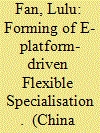

|
|
|
|
|
| Summary/Abstract |
E-commerce platforms have promoted the rise of consumer-demand-driven supply chains in the garment industry. This kind of supply chain has raised the demand for a new type of production organisation exemplified by low processing costs, small batches, multi-varieties, and quick reorders. Drawing on the insights of flexible specialisation theory, this paper proposes the concept of e-platform-driven flexible specialisation to describe this emerging production organisation form. This flexible specialisation is characterised by highly fragmented and informal production organisations such as husband-and-wife-run workshops and production units based on daily wage workers. In the context of a severe labour shortage in the garment industry, workers participate in the construction of these informal production organisations in order to obtain higher wages and work autonomy. However, the increase in informal employment also makes garment workers more atomised and vulnerable to social risks such as the outbreak of COVID-19. It is necessary to innovate labour relation negotiation modes to cope with the impacts of the rise of the platform economy on labour relations.
|
|
|
|
|
|
|
|
|
|
|
|
|
|
|
|
| 7 |
ID:
193019


|
|
|
|
|
| Summary/Abstract |
This paper relies on literature review and primary data collected through in-depth interviews with 21 respondents to examine the political economy dynamics of the cocoa value chain in Ghana. The historical analysis, which was based on the political settlements framework, has shown that the policies implemented in the cocoa sector went through four periods. The colonial era was characterised by a fairly corporate governance system and struggle between European traders and farmer cooperatives for monopoly over internal marketing of cocoa. This was followed by the early post-independence era (1957–1980), which was characterised by neopatrimonialism and over-taxation of cocoa farmers. The third phase (1980–2000) witnessed economic reforms and liberalisation. The fourth phase (2000 to present) saw increased public–private partnerships aimed at empowering women and promoting environmentally friendly farming activities. The paper concludes that the policies in the cocoa sector have, historically, created more benefits (rents) to political elite and their crony capitalists. Given that rent-seeking behaviour is a threat to the sustainability of the cocoa sector, the paper urges international development partners and civil society groups to demand greater accountability and transparency from the political elite and state institutions in the cocoa sector.
|
|
|
|
|
|
|
|
|
|
|
|
|
|
|
|
| 8 |
ID:
170633
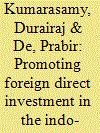

|
|
|
|
|
| Summary/Abstract |
Indo-Pacific construct has picked up a motivating pace in recent years. Several countries across the world have shown their interest in joining the Indo-Pacific region. Indo-Pacific region has been the world’s leading source and destination of foreign investment. This article analyses the trends in investment, bilateral and multilateral investment engagements and investment barriers and presents a way to promote foreign direct investment (FDI) in the Indo-Pacific region. It also examines India’s investment relations with some of the Indo-Pacific countries. Further, it looks into the inter-linkages between FDI and global value chain, given that multinational firms play a significant role in bringing international sourcing, technology sharing, and production networking across countries.
|
|
|
|
|
|
|
|
|
|
|
|
|
|
|
|
| 9 |
ID:
168822


|
|
|
|
|
| Summary/Abstract |
Over the last several decades, new forms of targeted market development have been embraced as solutions to uneven development and market failures. The popular model of inclusive ‘value chain development’ aims to harness markets to address broader development agendas by means of pro-active, micro-market engineering by development experts. This paper examines how inclusive market-making interventions touch down in an agrarian district in Nepal. It focuses on the role of ‘development brokers’ who are enrolled as market engineers and charged with mediating the tensions between profit-oriented market logics and pro-poor goals. The paper argues that even as value chain development aims to depoliticise market failures, the new forms of state–market–society encounters entailed in market-making can also work to bring markets into view as objects of political practice.
|
|
|
|
|
|
|
|
|
|
|
|
|
|
|
|